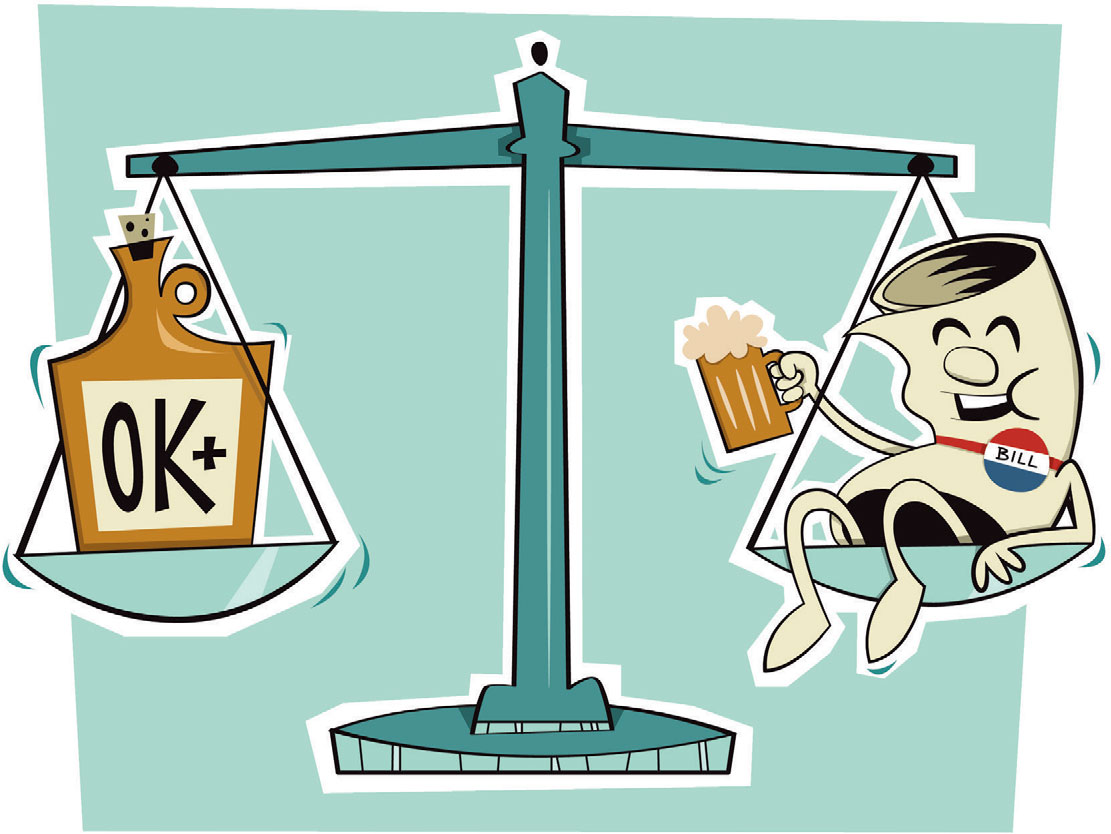OK Beer Laws
It’s time to end Prohibition in our state
Coming into your own as a drinker in Oklahoma, as a native, one invariably learns one lesson first, and one lesson fast: Check your can for “OK+.” It’s the only way to know you’ll get your money’s worth. It’s the only way to know you’re not wasting your time.
And everyone’s been burnt from losing the Saturday Night Shuffle—that quietly hectic period around 8:45–9pm after which the stores close, and Sunday sales are, by law, forbidden—that is, unless you want to buy watered-down beer at a convenience store, by mandate no more than 3.2% alcohol by weight.
It’s not a hard system to wrap your head around, but it is inconvenient and, behind the scenes, pretty economically backwards. Fortunately for Oklahomans, all this might soon change—for the better.
It often seems that every time our Oklahoma politicians open their mouths, we end up with a new national embarrassment on our hands—but there are people in our Senate who are proving themselves of late to be unambiguously on the side of good, by which I mean the side of beer.
For proof, look no further than the inspiring longevity of Senate Bills 383 and 424—two measures that, if passed into law, would radically change Oklahoma’s beer and brewing landscape. As of this writing, both bills have passed the Senate and are on their way to the House’s Alcohol, Tobacco and Controlled Substance Committee. Whether they will make it into law undamaged, or past the Senate at all, remains to be seen—but here, we have our fingers crossed.
So what would these bills do? What do they aim to accomplish? And is it possible to easily explain them in a way that is interesting? (The answer is no, not really. I’m sorry. It is very hard.)
To start, there’s SB 383, authored by Oklahoma City Republican Stephanie Bice. Of the two, this is the one more likely to excite and amaze on a consumer level, in that it would allow, at last, for regular beer, undiluted, to be sold, chilled, essentially everywhere. Originally intended to allow such sales in liquor stores, a recent amendment significantly broadened its scope, and while there are more complexities and restrictions to it, in essence the bill would end Oklahoma’s long-standing embargo on selling cold, full-strength beer—which is amazing. A game-changer. We’ll call this the Refrigeration Bill.
Then there’s SB 424, authored by Tulsa Republican Brian Crain. This one would be most exciting for commercial brewers, craft beer companies and their ardent connoisseurs, owing to the fact that, if passed, it would allow breweries to sell their beer, full-strength, on site at their breweries without inane restrictions. Currently, if you pop by, say, Marshall Brewing Co. for a sampling of their brews, fresh and straight from the source, for the most part that’s just what you’ll get: a sample. And I doubt there’s a brewer on this earth who enjoys the thought of having their hands tied, by law, on their own property, when it comes to sharing their passions with the public. SB 424 would change that. We’ll call it the Point of Production and Sales Bill. Unsurprisingly, this is a bill that has the brewers’ support.
“I think anytime the nanny state gets out of the way and lets adults make grown-up decisions on what to spend their hard-earned money on, it creates a more efficient and business- friendly environment to grow jobs and stop the brain drain to other states that have less ridiculous laws,” says Blaine Stansel, CEO and co-founder of the Roughtail Brewing Co. in Oklahoma City. It’s an opinion that doesn’t come as a shock from a company that proudly proclaims to make “freaking strong, aggressive, smack-you-in-your-face beer”—a practice that should be allowed to flourish, hither and yon. Beyond the palate, and this author’s serious zest for high-octane beer like that, the economic benefits of giving breweries more freedom are not hard to theorize about.
“The modernization of our liquor laws [is] a great step forward for the state,” says Kevin Hall, champion of LOCAL—the League of Oklahomans for Change in Alcohol Laws—whose lobbying efforts and “Free the Taps” campaign have been essential in getting bills like these to the forefront of the legislature. “There is no question that brewery tourism—beercations—generates considerable tourism revenue for areas and increases jobs. Oklahomans do not have to go far to see this: The Fayetteville Ale Trail [in Arkansas] is a wonderful example of breweries driving tourism. The Bend Ale Trail in Oregon is another example, as thousands have flocked to the Bend area to spend their dollars at Oregon breweries, and then spend their dollars at hotels, gas stations, restaurants, bars and package stores.”
Speaking personally, this is 100% accurate. I spend a lot of money on good beer, and anyone who makes it easier for me to get good beer, when I want it, cold and ready to go, or in the homey confines of one of my favorite breweries, is going to get a good share of that change. But will these bills pass in an effective form? It’s hard to say. Politics is a fickle thing in Oklahoma, as unpredictable as the weather, and often disappointing. But the fact that we’re even having the conversation is a step further away from these senseless trappings of Prohibition, where the only practical purpose is to make it slightly harder to consume what you want to consume, and the economic damages are legion—we’re leaving money on the table.
Right now, Oklahoma has some truly great, world-class breweries—businesses that generate income, prestige and provide a product people love. The fact that they’ve managed to achieve such success while tied down and legally crippled is nothing short of miraculous. You should see the look on brewers’ faces when we talk together about beer laws—ask them yourself, and see the strain and disappointment. As it stands now, we are outclassed by our own volition, and amid a nationwide craft brewing revolution we run the risk of being left behind.
Consumer-driven lobbying got us this far—the powers that be are listening. So keep your eye on the news for updates, and keep the pressure on the legislators to hear and act upon the will of the people. For a one-stop shop, LocalOK.org has all the information you need on these bills in particular: the lawmakers behind them, the breweries that support them and updates on the day-to-day progress of their long journeys into law.
I have no doubt that one day we will raise our glasses to a successful overthrow of these old rules, and usher in a new era—and the sooner the better. We’ve never been closer to such a radical change.
OK+? OK please. Let’s end the embargo, and make Oklahoma the craft beer destination we all know it’s primed to be.




